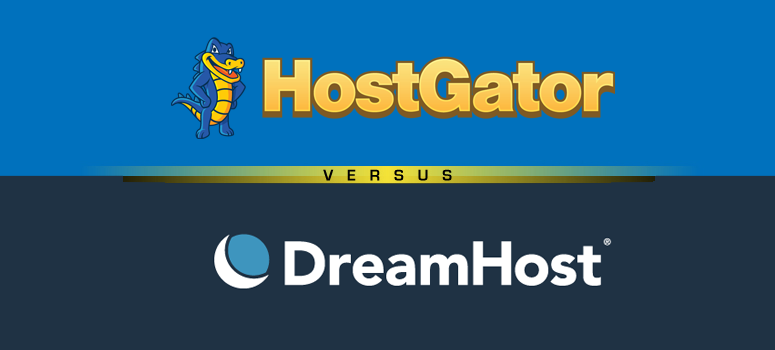
Are you wondering which is the better hosting option: HostGator or DreamHost? They’re 2 of the most popular web hosting companies out there. But one has to be better than the other, right?
In our UNBIASED comparison between HostGator and DreamHost, we’ll help you figure out the best choice for your budget and needs.
HostGator vs. DreamHost – Overview
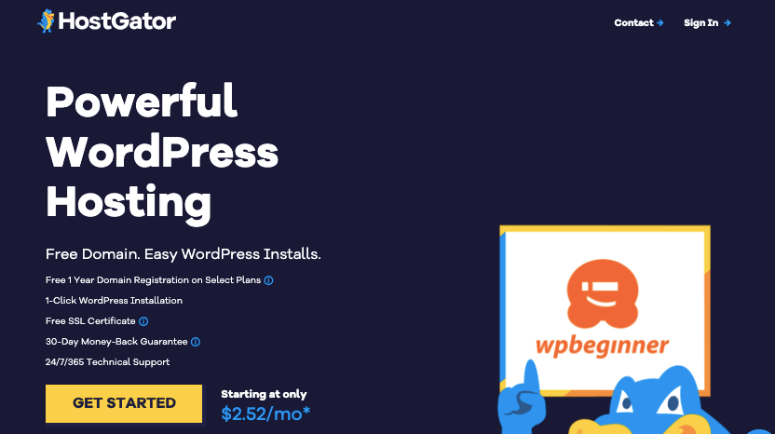
HostGator and DreamHost are 2 of the most popular web hosting providers on the market. HostGator was founded in 2002 and currently hosts over 8 million websites. DreamHost, on the other hand, was founded back in 1996, a year before the advent of Google. They now serve over 1.5 million websites, blogs, and applications with over 400k happy customers. Both are PCI compliant web hosting companies.
While Endurance International Group acquired HostGator in 2012, DreamHost is still independently owned and operated.

Both HostGator and DreamHost provide a wide variety of hosting options including shared, VPS, and dedicated server. Both of them particularly rock the shared hosting space with their affordable hosting plans.
HostGator vs. DreamHost – Speed and Uptime
The most important factors you need to consider when choosing a web hosting service are website speed and uptime. Web hosting companies often brag about high server response times and their uptime guarantees.
To check if they live up to the hype, we signed up for their shared hosting plans and created a test site on both HostGator and DreamHost. To mirror the live website environment on our testing sites, we installed the default WordPress theme and added dummy content along with some images.
And then we conducted a few different performance tests on our test sites:
- Pingdom test: To monitor the page loading time.
- Load Impact test: To see how the server responds during a traffic surge.
- Bitcatcha test: To record server response time on 8 different international locations by totally ignoring the content.
And here’re our results:
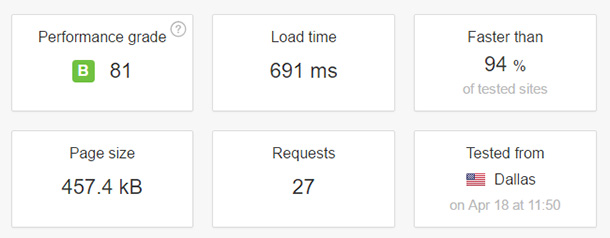
According to Pingdom, HostGator took 691ms to load when tested from Dallas. That’s faster than 94% of all tested sites.
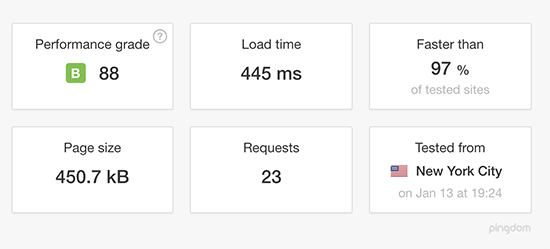
Our DreamHost test site loaded in less than half a second, which is faster than 97% of all tested sites.
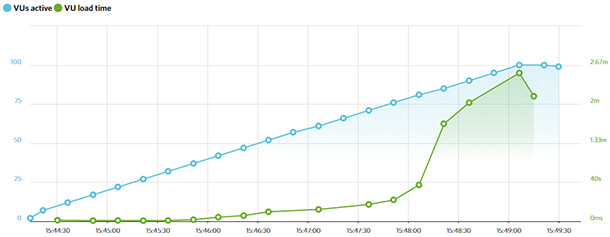
According to Load Impact, our HostGator server responded quickly until there were about 80 visitors at a time. As traffic grew, the site started to slow down.
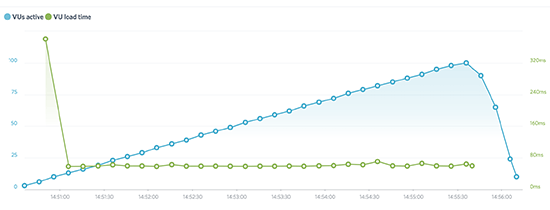
As you can see in the chart, our DreamHost site remained stable during the traffic surge test. The number of live visitors didn’t have any impact on the response time.

According to our Bitcatcha test, our HostGator server responded in just a fraction of seconds in the United States. While response time was relatively high in international locations, it still responded in less than a second. HostGator’s server was rated C by Bitcatcha, whereas our DreamHost site was rated A+.

Winner: DreamHost
HostGator vs. DreamHost – Ease of Use
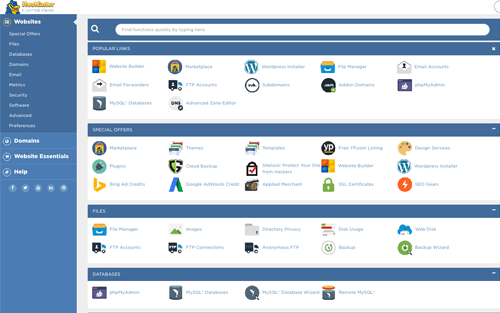
Unlike HostGator, DreamHost doesn’t come with a cPanel dashboard. Instead, they have their own web-based control panel.
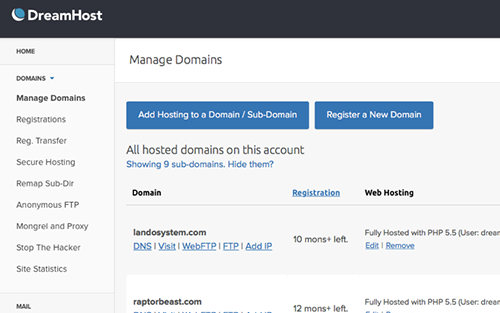
That means, if you’re already familiar with the most popular web hosting control panel (cPanel), then there’s a bit of learning curve to tackle before using DreamHost’s control panel.
Winner: HostGator
HostGator vs. DreamHost – Features
The best thing about HostGator is that they provide you with more hosting features than any of their competitors.
Before we jump in and start looking at how HostGator stacks up against DreamHost in terms of features, let’s take a look at it the other way around – a few areas where DreamHost excels in comparison to HostGator.
SSD Storage:
DreamHost offers Solid State Drives storage whereas HostGator offers Hard Disk Drive (HDD) storage. SSD is proven to be faster than HDDs for up to 2 times.
Free domain name:
When signing up, DreamHost gives you a free domain name whereas HostGator doesn’t offer one. However, the free domain name offer is more of a marketing gimmick than a useful feature because if you register a domain name with DreamHost for free, you’ll have to pay around $15 per year after the first year. Instead, you could’ve registered a domain name with a domain registrar like Domain.com for as low as $12 annually.
If you want to save on domain costs in the long run, we suggest you use a domain name registrar.
Except for SSD storage and a free domain name, HostGator pulls miles ahead of DreamHost in terms of features…
- Unlimited emails: With HostGator, you get unlimited email accounts with any of their hosting plans. However, you’d have to opt for the most expensive plan to set up emails with your DreamHost hosting account.
- Advanced website builder: Both DreamHost and HostGator offer website builders with their hosting plans, but HostGator’s builder stays ahead of the curve with its advanced functionalities, including an eCommerce storefront.
- Free dedicated IP: With HostGator’s high-end shared hosting plan, you get a free dedicated IP and SEO tools, whereas DreamHost doesn’t offer either with any of their shared hosting plans.
- Free ad credits: With every HostGator hosting plan, you get $200 worth of ad credits to attract traffic to your site. DreamHost’s hosting plans aren’t bundled with any free ad credits.
Winner: HostGator
HostGator vs. DreamHost – Support and Documentation
HostGator provides superior 24/7 support via live chat, phone, and email. Their online support portal covers every aspect of building a website with HostGator. It contains over 500 video tutorials and 680 helpful articles.
DreamHost used to offer limited support but they’ve amped that up to 24/7 support.
Winner: HostGator
HostGator vs. DreamHost – Pricing
Here’s a detailed comparison between the pricing for different hosting options from DreamHost and HostGator.
| Shared | WordPress | VPS | Dedicated | |
|---|---|---|---|---|
| HostGator | $2.52 /mo. | $3.05 /mo. (Cloud) | $34.99 / mo. | $89.98 / mo. |
| DreamHost | $2.59 / mo. | $2.59 / mo. | $10.00 / mo. | $149.00 / mo. |
The regular price for DreamHost’s shared hosting plan starts at $5.99 per month. However, we’ve made an exclusive deal with DreamHost so you’d only have to pay $2.59 per month.
DreamHost offers managed WordPress hosting, so you don’t have to know the technicalities of optimizing the server for boosting your site’s performance because DreamHost handles it for you.
On the other hand, HostGator offers WordPress cloud hosting, which provides a faster website experience than their shared hosting plan.
You can also use our HostGator coupon code to get a BIG discount.
If you’re looking for the cheapest hosting introductory plans, then look no further than DreamHost. Keep in mind that after the initial payment period, you’ll be required to pay their regular prices.
Winner: DreamHost
Recap: HostGator vs. DreamHost
After our comparison, it’s evident that HostGator is the best choice for your website. Not only do they provide tons of useful hosting features, but their control panel is also super easy to use.
HostGator’s award-winning support has always got your back. Unlike DreamHost, they provide 24/7 support via live chat, phone, and email.
With DreamHost, you’d have to make a separate payment for phone support. While free callback support is available, it’s only included in their most expensive pricing tier.
Also, you’d like to check out our expert’s comparisons between,
- HostGator vs GreenGeeks
- HostGator vs InMotion Hosting
- HostGator vs iPage
- HostGator vs Liquid Web
- HostGator vs A2 Hosting
We hope this article helped you choose between HostGator and DreamHost. For more details, check out our complete HostGator review and in-depth DreamHost review.
